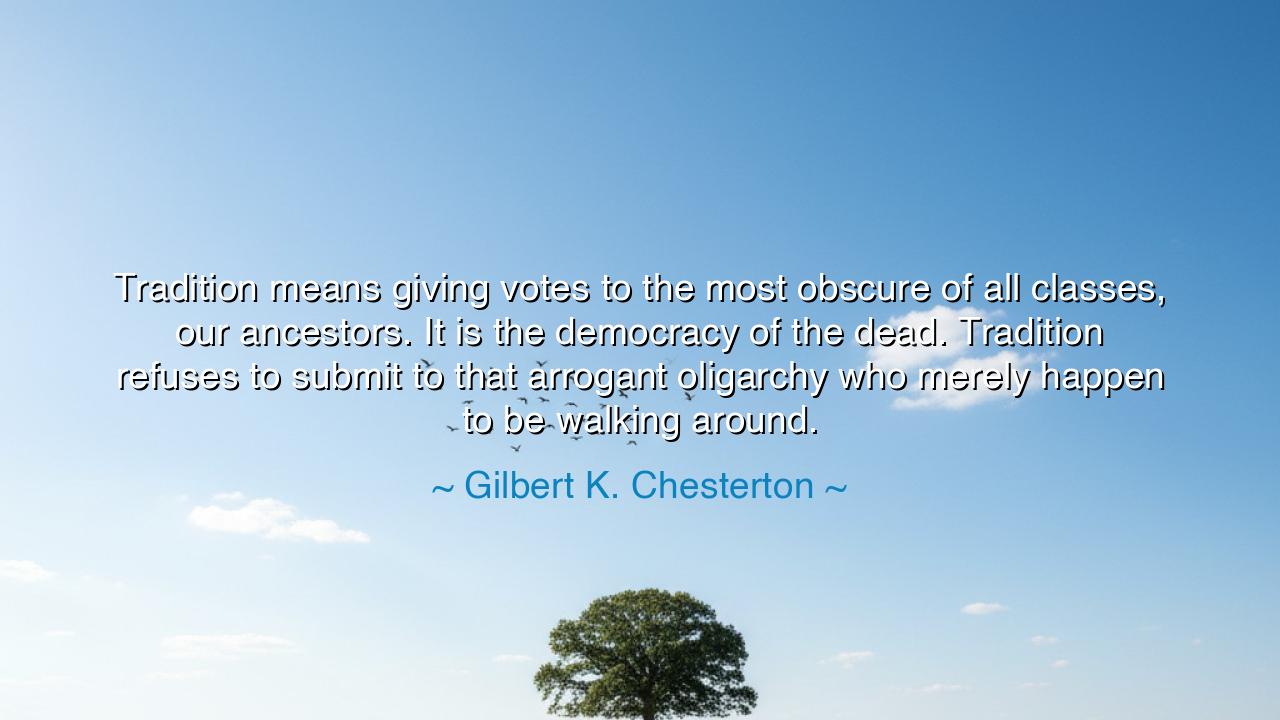
Tradition means giving votes to the most obscure of all classes
Tradition means giving votes to the most obscure of all classes, our ancestors. It is the democracy of the dead. Tradition refuses to submit to that arrogant oligarchy who merely happen to be walking around.






The words of Gilbert K. Chesterton — “Tradition means giving votes to the most obscure of all classes, our ancestors. It is the democracy of the dead. Tradition refuses to submit to that arrogant oligarchy who merely happen to be walking around.” — resound like a trumpet from the ages, calling us to humility before the wisdom of those who came before. Chesterton, master of paradox and defender of common sense, sought to remind his generation that the past is not a corpse to be buried, but a voice to be heard.
The meaning is profound. Tradition is not the chains of the past, but the collective memory of humanity, the vote of the countless souls who built the foundations on which we stand. By calling it the democracy of the dead, Chesterton declares that every generation is part of a great assembly — not only of the living, but also of the departed, who through custom, story, and faith continue to shape the present. To reject tradition is to silence the largest portion of the human race, leaving decisions only to the narrow and fleeting few “who happen to be walking around.”
History proves this truth. Consider the framers of the United States Constitution, who looked not only to their own desires, but to the wisdom of English common law, to the heritage of Rome and Greece, to centuries of thought on liberty and justice. By honoring tradition, they created a document that has endured for centuries. Had they relied solely on the impulses of their moment, the republic might have been nothing more than a passing experiment.
Yet Chesterton’s words also serve as a warning. In every age there are those who dismiss the voices of the ancestors, imagining themselves wiser simply because they are newer. But to ignore the past is to fall into arrogance, to repeat mistakes already paid for in blood and suffering. Revolutions that scorned tradition, such as the French Revolution in its darkest days, brought not freedom but terror, because they cast aside the accumulated wisdom of generations and enthroned only the passions of the living.
Let this wisdom endure: honor the ancestors, for they speak still, through the practices, values, and lessons they left behind. Do not scorn tradition, for it is the chorus of the ages, the counsel of millions who once walked where we now walk. Chesterton’s voice rises like that of a prophet: remember that the present is but a breath, and those who live today are but one small council in the vast parliament of time. To reject the democracy of the dead is to silence the wisdom of eternity.






NTHa Son Nguyen Tran
I like the idea that tradition holds a 'vote' from our ancestors, but it also makes me wonder how much weight we should give to traditions that may no longer serve us. Are we allowing the dead to dominate our decisions to an extent that harms progress? How can we honor the past while being more selective about which traditions are worth preserving? Should tradition adapt, or is it meant to remain unchanged?
HHai
Chesterton’s metaphor of tradition as a 'democracy of the dead' is interesting, but it raises questions about how we view our relationship with the past. Does it mean we’re obligated to respect every tradition, or should we evaluate which traditions still have value in today’s world? Can we modernize while still honoring the past, or is that a contradiction? What role should history play in shaping our current decisions?
XGXxcjk Ghjgfj
I appreciate how Chesterton characterizes tradition as a form of democracy, where even those who no longer have a voice still get to participate. But does that mean tradition can sometimes be an obstacle to change? Can we truly honor the wisdom of the past while also making room for new ideas? How do we avoid the arrogance of assuming we know better than those who came before us?
TLTang thi thanh loan
This quote seems to highlight the tension between tradition and progress, implying that tradition holds a certain power over us. But is that power always negative? Can tradition help ground us, or does it limit our ability to innovate? What’s the right balance between honoring the past and forging our own path? Should we consider the voices of our ancestors more, or should we focus on those alive today?
GBtran gia bao
I find Chesterton’s idea of tradition as a 'democracy of the dead' to be both poetic and provocative. It suggests that we are constantly influenced by the past, but also that this influence can prevent the current generation from making its own choices. Does this mean that living in the present can sometimes feel suffocated by the expectations of the past? How do we move forward without disregarding those who came before us?